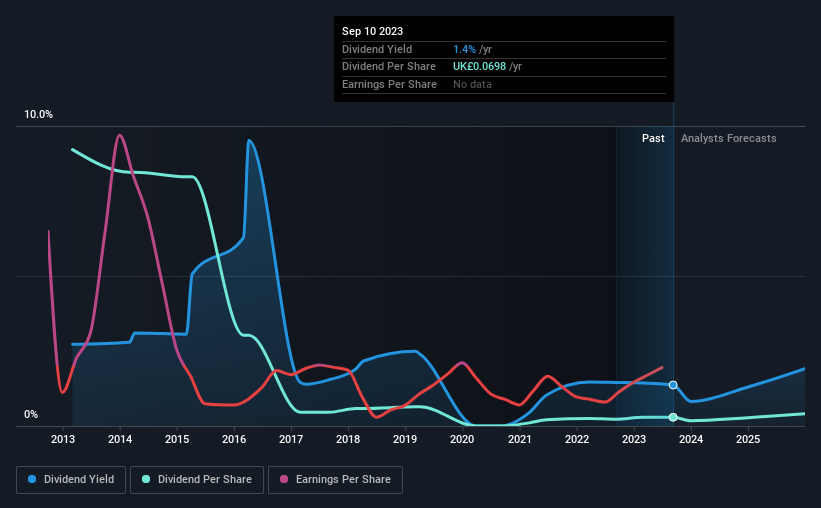- United Kingdom
- /
- Aerospace & Defense
- /
- LSE:MRO
Melrose Industries (LON:MRO) Is Due To Pay A Dividend Of £0.015

Melrose Industries PLC's (LON:MRO) investors are due to receive a payment of £0.015 per share on 20th of October. This payment means the dividend yield will be 1.4%, which is below the average for the industry.
Check out our latest analysis for Melrose Industries
Melrose Industries Is Paying Out More Than It Is Earning
If it is predictable over a long period, even low dividend yields can be attractive. Even though Melrose Industries is not generating a profit, it is still paying a dividend. Along with this, it is also not generating free cash flows, which raises concerns about the sustainability of the dividend.
Earnings per share is forecast to rise exponentially over the next year. If the dividend continues along recent trends, we estimate the payout ratio could reach 651%, which is unsustainable.

Dividend Volatility
The company's dividend history has been marked by instability, with at least one cut in the last 10 years. Since 2013, the annual payment back then was £2.21, compared to the most recent full-year payment of £0.0698. This works out to a decline of approximately 97% over that time. Generally, we don't like to see a dividend that has been declining over time as this can degrade shareholders' returns and indicate that the company may be running into problems.
The Company Could Face Some Challenges Growing The Dividend
Given that dividend payments have been shrinking like a glacier in a warming world, we need to check if there are some bright spots on the horizon. Melrose Industries has seen EPS rising for the last five years, at 14% per annum. Unprofitable companies aren't normally our pick for a dividend stock, but we like the growth that we have been seeing. All is not lost, but the future of the dividend definitely rests upon the company's ability to become profitable soon.
Melrose Industries' Dividend Doesn't Look Sustainable
Overall, we don't think this company makes a great dividend stock, even though the dividend wasn't cut this year. Strong earnings growth means Melrose Industries has the potential to be a good dividend stock in the future, despite the current payments being at elevated levels. We would probably look elsewhere for an income investment.
It's important to note that companies having a consistent dividend policy will generate greater investor confidence than those having an erratic one. Meanwhile, despite the importance of dividend payments, they are not the only factors our readers should know when assessing a company. Taking the debate a bit further, we've identified 2 warning signs for Melrose Industries that investors need to be conscious of moving forward. Looking for more high-yielding dividend ideas? Try our collection of strong dividend payers.
If you're looking to trade Melrose Industries, open an account with the lowest-cost platform trusted by professionals, Interactive Brokers.
With clients in over 200 countries and territories, and access to 160 markets, IBKR lets you trade stocks, options, futures, forex, bonds and funds from a single integrated account.
Enjoy no hidden fees, no account minimums, and FX conversion rates as low as 0.03%, far better than what most brokers offer.
Sponsored ContentNew: Manage All Your Stock Portfolios in One Place
We've created the ultimate portfolio companion for stock investors, and it's free.
• Connect an unlimited number of Portfolios and see your total in one currency
• Be alerted to new Warning Signs or Risks via email or mobile
• Track the Fair Value of your stocks
Have feedback on this article? Concerned about the content? Get in touch with us directly. Alternatively, email editorial-team (at) simplywallst.com.
This article by Simply Wall St is general in nature. We provide commentary based on historical data and analyst forecasts only using an unbiased methodology and our articles are not intended to be financial advice. It does not constitute a recommendation to buy or sell any stock, and does not take account of your objectives, or your financial situation. We aim to bring you long-term focused analysis driven by fundamental data. Note that our analysis may not factor in the latest price-sensitive company announcements or qualitative material. Simply Wall St has no position in any stocks mentioned.
About LSE:MRO
Melrose Industries
Designs and delivers aerospace components and systems for civil and defence markets in the United Kingdom, rest of Europe, North America, and internationally.
Reasonable growth potential and fair value.
Similar Companies
Market Insights
Community Narratives



